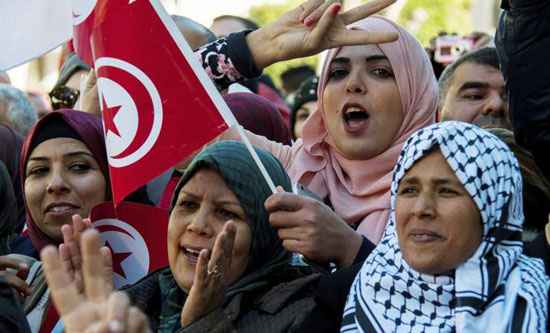
A rally in Tunis to mark the seventh anniversary of the toppling of President Ali and the start of the Arab Spring: the issues that sparked the 2011 uprising have not been resolved.
Seven years after mass protests in Tunisia forced the resignation of President Ben Ali in January 2011, and set in motion the ‘Arab Spring’, thousands of Tunisians have come out on the streets once again demanding real change. Few, if any, of the issues which sparked the 2011 uprising have been addressed by the so-called ‘revolution’. Harsh austerity measures mandated by the International Monetary Fund (IMF) to secure its financial support have galvanised large sections of the Tunisian working class into action against falling living standards, high unemployment, and government corruption. Urban student leaders have formed the ‘What are we waiting for?’ movement and faced arrest and state repression. 34 years earlier, in January 1984, massive bread riots in response to IMF conditions were put down by force, killing 100 protesters. This time the movement has to address the real economic roots of their grievances – the capitalist system. Toby Harbertson reports.
On 1 January 2018 the new austerity budget imposed sweeping cuts to reduce the budget deficit, and further drive down the living standards of the working class and oppressed. It included increases in VAT, cuts in subsidies and further cuts to public sector jobs and salaries. Prices have been driven up and the currency has devalued significantly. In April 2016 the government agreed a four-year package of support worth $2.8bn with the IMF, conditional upon economic reforms to meet the needs of international capital. Resistance to the initial implementation of these reforms in 2016, including from the powerful UGTT union, delayed these cuts and the IMF delayed its second loan payment. The minister in charge of public sector reform – who was linked to the UGTT – was sacked in order to solve this political crisis. The 2018 budget is the next step in the government’s attempts to meet the IMF’s conditions.
The protests began in December 2017, with youths blocking the motorway near Balta, northern Tunisia, demanding jobs, public services, and an end to corruption. The ‘What are we waiting for?’ movement was founded by student leaders of left-wing parties, including the major ‘Popular Front for the Realisation of the Objectives of the Revolution’ opposition party, on 3 January 2018 in Tunis. The movement calls for the scrapping of the austerity budget and organises around the slogan: ‘employment, freedom, and national dignity’. Although ‘What are we waiting for?’ is based mainly among educated urban youth, other sectors of society soon swelled the protests. By 8 January they had spread to more than 20 towns, with tens of thousands participating. Powerful protests emerged in deprived towns in the centre and south of the country, including Kasserine and Sidi Bouzid. Night after night, large numbers of young people demonstrated in the working class suburbs of Tunis and other cities, attacking police and court buildings and building barricades.
The state responded with mass arrests in order to try and leave the movement leaderless. The organisers of ‘What are we waiting for?’ and the leaders of the Popular Front were targeted, along with militant youths. By 12 January almost 800 people had been arrested. On 8 January a protester called Khomsi Yefreni was killed in Tebourba by a government security vehicle – the government statement put his death down to asthma. The government sought to portray all the protesters as violent looters, and claimed the widespread involvement of Islamist terrorists. It has blamed ‘troublemakers’ and the opposition parties for stoking the protests. Both the Popular Front, and the Islamist Ennahda party – which participates in the ruling coalition – have joined calls for protests against the budget. On 13 January, the government announced a package of $70m of welfare payments to try and assuage the protests.
Youth unemployment in Tunisia stands at more than 35% according to the International Labour Organisation. Many people in the deprived south and central regions have no access to clean water or sanitary facilities.
The health care system is linked to employment meaning many people have no way to access health care. Islamic State-linked terrorist attacks on tourists have seriously damaged Tunisia’s once booming tourist industry. Public sector workers have faced pay freezes and widespread redundancy. Suicide rates are rising sharply. Both an increasingly proletarianised middle class, and the poorest sections of the young urban working class have been driven to political action by the conditions.
Sunday 14 January marked the seventh anniversary of the toppling of Ben Ali and the formal democratisation of Tunisia, the first major event of the ‘Arab Spring’. A tightly-controlled march was held in Tunis and was dominated by mainstream political forces, attracting several thousand people. Most of the more radical sections that had taken part in the earlier protests stayed away. Protests once again broke out in working class neighbourhoods that evening. The wave of mass protests appears to be dying down for now. What will be crucial now is whether ‘What are we waiting for?’ will fight to win the confidence of the mass of the working class and articulate a real challenge to the government, the IMF, and the system which is driving Tunisians deeper into poverty.
Fight Racism! Fight Imperialism! 262 February/March 2018




